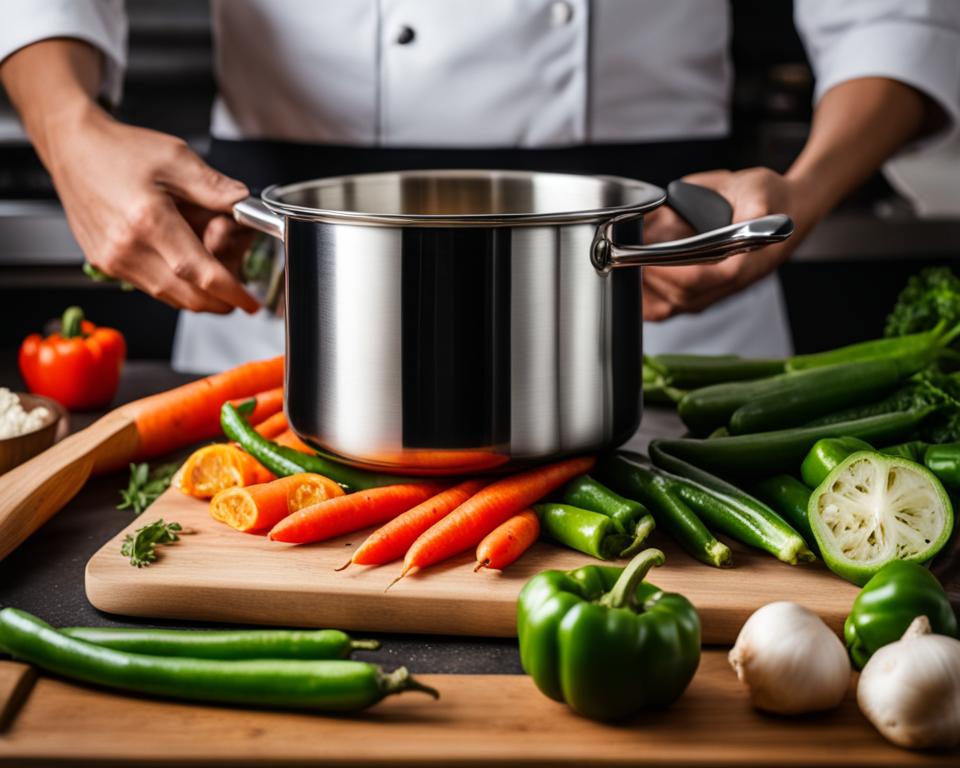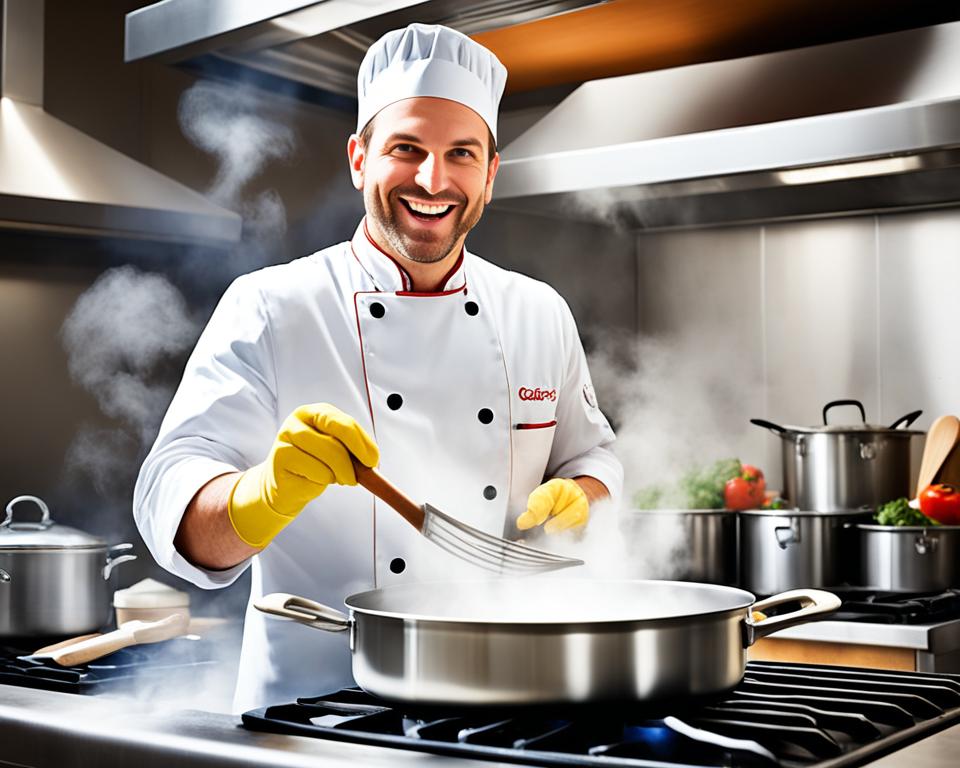Introduction
Cookware is a type of kitchenware used to prepare food by applying heat. Cookware can be made from a variety of materials, including metal, glass, ceramic, and plastic. Each material has its own advantages and disadvantages, and the best type of cookware for you will depend on your cooking needs and preferences.
In this article, we will discuss the different types of cookware available, as well as the benefits and drawbacks of each type. We will also provide tips on how to choose the right cookware for your needs and how to care for your cookware properly.
Whether you are a novice cook or a seasoned pro, we hope that this article will help you to find the perfect cookware for your kitchen.
Benefits of using cookware
Cookware is an essential kitchen tool that can help you prepare delicious meals. There are many different types of cookware available, each with its own set of benefits. Some of the benefits of using cookware include:
- Cookware can help you cook food evenly and quickly.
- Cookware can help you retain nutrients in food.
- Cookware can help you create dishes with a professional finish.
- Cookware can make it easier to clean up after cooking.
When choosing cookware, it is important to consider the type of food you will be cooking, the number of people you will be cooking for, and your budget. There are many different types of cookware available, so you are sure to find something that meets your needs.
Different types of cookware
There are many different types of cookware available on the market, each with its own unique advantages and disadvantages. Some of the most common types of cookware include:
- Stainless steel cookware
- Nonstick cookware
- Cast iron cookware
- Copper cookware
- Aluminum cookware
Each type of cookware has its own unique set of properties that make it better suited for certain tasks than others. For example, stainless steel cookware is durable and versatile, making it a good choice for everyday cooking. Nonstick cookware is easy to clean, making it a good choice for busy cooks. Cast iron cookware is heat-resistant and can be used for both stovetop and oven cooking. Copper cookware is highly conductive, making it a good choice for searing and browning foods. Aluminum cookware is lightweight and affordable, making it a good choice for budget-minded cooks.
When choosing the right type of cookware for your needs, it is important to consider the following factors:
- The type of cooking you will be doing
- The budget you have
- The amount of care and maintenance you are willing to put into your cookware
By considering these factors, you can choose the type of cookware that is best suited for your needs.
How to choose the right cookware
When choosing cookware, there are a few factors to consider, such as the material, the type of cooking you will be doing, and your budget.
Here is a more detailed look at each of these factors:
- Material: The most common cookware materials are stainless steel, nonstick, cast iron, and ceramic. Each material has its own advantages and disadvantages, so it is important to choose the one that is best suited for your needs.
- Type of cooking: If you only plan on doing basic cooking, such as boiling water or making pasta, then you can get by with a basic set of cookware. However, if you plan on doing more advanced cooking, such as searing meat or making sauces, then you will need to invest in more specialized cookware.
- Budget: Cookware can range in price from very affordable to extremely expensive. It is important to set a budget before you start shopping so that you can narrow down your choices.
Once you have considered these factors, you can start to narrow down your choices and find the right cookware for your needs.
How to care for your cookware
Cookware is an important investment, so it’s important to take care of it properly in order to extend its lifespan. Here are a few tips for caring for your cookware:
- Wash your cookware by hand with warm, soapy water. Avoid using harsh chemicals or abrasive cleaners, as these can damage the finish.
- Rinse your cookware thoroughly after washing to remove all soap residue.
- Dry your cookware immediately after washing to prevent rust.
- Do not use metal utensils on nonstick cookware, as this can damage the coating.
- Do not use your cookware over high heat, as this can damage the cookware and make it more likely to warp.
- If your cookware becomes scratched or damaged, it’s best to replace it, as this can make it more difficult to clean and can lead to food contamination.
By following these tips, you can help to keep your cookware in good condition for years to come.
VI. Common mistakes when using cookware
Here are some common mistakes people make when using cookware:
- Using too much heat
- Using the wrong type of cookware for the heat source
- Not preheating the cookware before adding food
- Overcrowding the cookware
- Not using enough oil or butter when cooking
- Not stirring or shaking the food often enough
- Not letting the food rest before serving
By avoiding these mistakes, you can help to ensure that your food is cooked evenly and safely.
VII. Safety tips for using cookware
Here are some safety tips for using cookware:
- Always use potholders or oven mitts when handling hot cookware.
- Never leave hot cookware unattended on the stovetop or in the oven.
- Be careful not to spill hot oil or other liquids when cooking.
- Never place hot cookware on a cold surface, as this can cause it to crack or warp.
- Properly clean and dry your cookware after each use to prevent the growth of bacteria.
By following these safety tips, you can help to prevent accidents and injuries in the kitchen.
Cleaning and storing your cookware
Once you’ve finished cooking with your cookware, it’s important to clean it properly to prevent the build-up of bacteria and to extend its lifespan. Here are a few tips for cleaning your cookware:
- Wash your cookware in warm, soapy water immediately after use. This will help to loosen any food particles and prevent them from sticking to the surface.
- Avoid using harsh abrasives or scouring pads, as these can damage the surface of your cookware.
- If your cookware is heavily soiled, you can soak it in a solution of warm water and dish soap for a few minutes before washing it.
- Dry your cookware thoroughly after washing it to prevent the formation of rust.
Once your cookware is clean, it’s important to store it properly to prevent it from rusting or becoming damaged. Here are a few tips for storing your cookware:
- Store your cookware in a dry place, away from moisture.
- If you’re not using your cookware regularly, you can coat it with a thin layer of oil to prevent it from rusting.
- Don’t stack your cookware, as this can damage the finish.
By following these tips, you can keep your cookware clean and in good condition for years to come.
FAQs about cookware
Here are some common questions about cookware and their answers:
**Q: What is the best type of cookware?**
A: There is no one-size-fits-all answer to this question, as the best type of cookware for you will depend on your individual needs and preferences. However, some of the most popular types of cookware include stainless steel, nonstick, and cast iron.
**Q: How do I care for my cookware?**
A: The best way to care for your cookware will vary depending on the type of cookware you have. However, some general tips include:
- Wash your cookware by hand with warm, soapy water.
- Avoid using harsh chemicals or abrasive cleaners on your cookware.
- Do not use metal utensils on nonstick cookware.
- Season cast iron cookware regularly to prevent rust.
**Q: What are some common mistakes people make when using cookware?**
A: Some common mistakes people make when using cookware include:
- Overheating your cookware.
- Using too much heat.
- Using the wrong type of utensils.
- Not cleaning your cookware properly.
**Q: What are some safety tips for using cookware?**
A: Some safety tips for using cookware include:
- Always use potholders or oven mitts when handling hot cookware.
- Never leave hot cookware unattended on the stovetop.
- Be careful not to spill hot oil or liquids when cooking.
- Store your cookware properly to prevent rust and damage.
**Q: Where can I buy bloomhouse cookware?**
A: You can purchase bloomhouse cookware online at the bloomhouse website or at select retailers.


